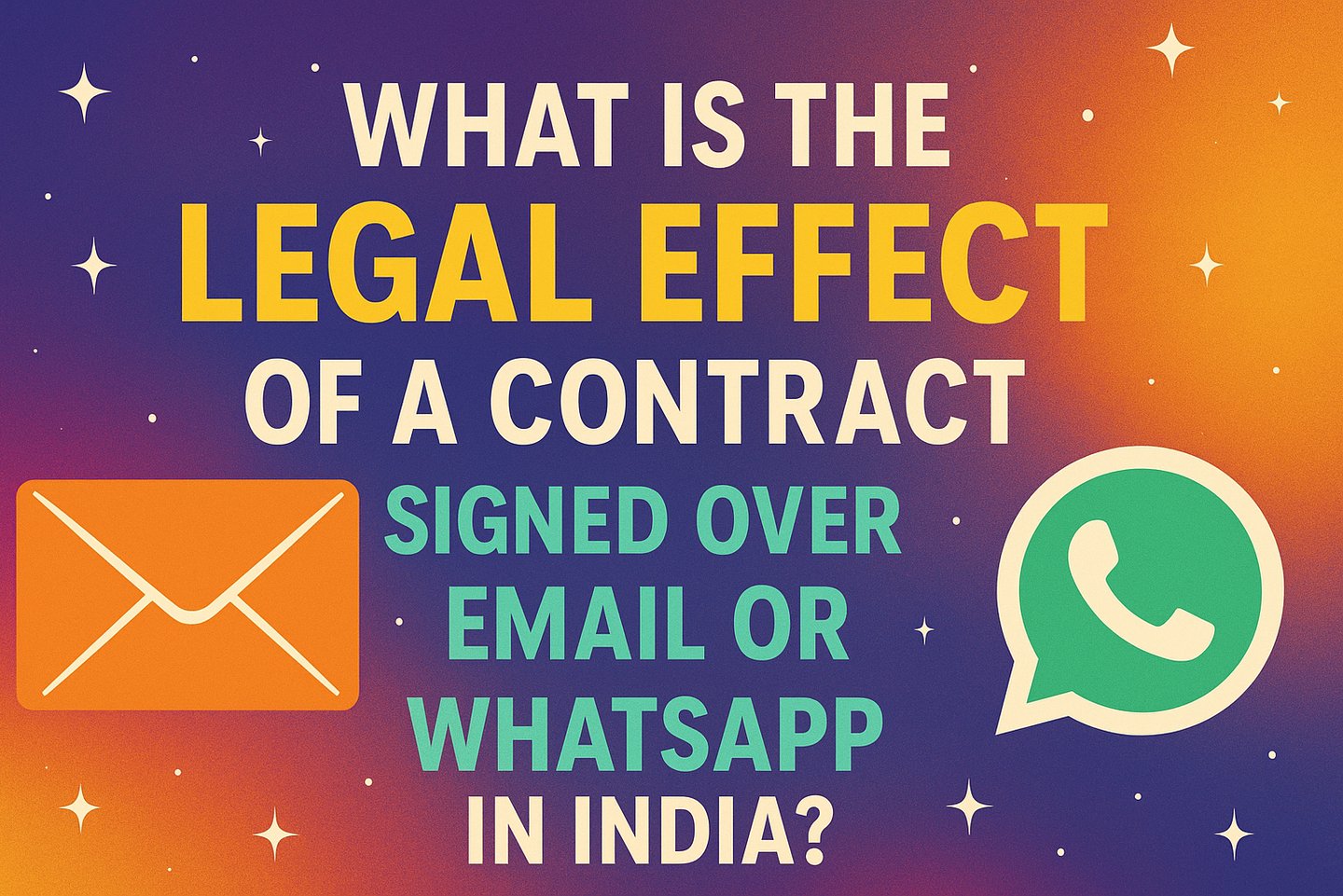What Is the Legal Effect of a Contract Signed Over Email or WhatsApp in India?
Agreements made through electronic contracts, which involved the use of email or WhatsApp, have become a common and legal way of entering into agreements in India, particularly following the increase in digital communication. The paper discusses the legal status, statutes, and court cases, as well as the practice needs of such contracts, particularly their enforceability, the evidence level, and the practice to follow in cases where a party is engaging in a digital contract.
CORPORATE LAWS
Arathi Menon
9/21/20253 min read


Introduction
The revolution of contract law in India has been brought about by the digitalization of trade and communication. (Pereira, 2019) Nowadays, negotiations and the conclusion of an agreement take place online, and emails and WhatsApp messages are used instead of a paper document. (Kennedy, 2009) This change poses important questions on whether the electronically signed contracts are legally binding and admissible in the courts and what the parties to the contracts are entitled and liable for.(Molnar, 2000) The Indian law has evolved to meet these realities and has rendered the digital contracts binding in law, provided they satisfy the conditions of a valid contract. (Id)
Legal Recognition by the Indian Law
Statutory Basis In India,
Section 10A of the Information Technology Act, 2000 (IT Act) specifically recognizes electronic contracts by saying that the fact that a contract was made electronically does not mean that it should not be legally recognized. (Murray, 2019) Regardless of whether the contract is made online or using messaging applications such as WhatsApp, the Indian Contract Act, 1872, has been and still continues to apply to any contract provided that its main aspects include an offer, acceptance, legal consideration, and the intent to establish legal relations. The IT Act excludes some types of documents (including powers of attorney or wills) from electronic execution in the First Schedule, and they must be physically signed. (Butler, 2003) Nevertheless, in the case of the majority of commercial contracts, email contracts or even instant messaging agreements are binding.
Electronic Signatures
The IT Act entails legal registration of digital and electronic signatures, and the validity of these signatures is the same as that of handwritten signatures. In the majority of the contracts, even a set of emails with the manifestation of the willingness, without a formal electronic and digital signature, may be sufficient. Chats in WhatsApp, provided that they contain an unambiguous consent to the terms of the contract, can also form enforceable contracts. The courts consider the content and not the form of consent (Pennels, 2001).
Judicial Precedents
Time and again Indian courts have stated that a contract does not have to be signed physically in order to bind (O’Sullivan & Schmid, 2001). It is important to mention that the Supreme Court in Trimex International FZE v. The Vedanta Aluminium Ltd. (2010) confirmed that contracts that were signed by email communication, which included agreement of the terms and transmission of acceptance, are legally binding. The more current rulings by the upper courts have also affirmed WhatsApp and email message chain emails as valid and binding contracts on the condition that they exhibit offer and acceptance on essential terms.
Evidentiary Value and Enforcement
Admissibility in Court The Indian Evidence Act, 1872, 65A and 65B, attest to the fact that electronic records (emails and chat logs) may be presented in court as long as there is a certificate that confirms the authenticity of the electronic record. The assumption is that electronic documents are valid as long as the integrity, origin, and relevance of the documents can be established using metadata, timestamps, and the identity of the senders and receivers, as well as supporting documentation. (Hornbæk & Frøkjær, 2001)
Integrity and Non-Repudiation.
For enforceability:
Identification of parties should be made clear.
The terms of acceptance have to be clear.
The exchange record ought to be in the original form.
Digital or electronic signatures are more reliable where applicable but are not compulsory in all contracts.
Even unofficial contracts like a mere deal confirmed or "OK" agreed through WhatsApp could be considered a binding contract provided that the context shows that the parties are intending to act. (Melo et al., 2019) Nevertheless, the courts can examine unclear, imprecise, or unfinished online communications because they lack unanimity or necessary intent to enter the contract.
Conclusion
The contract signed via email or WhatsApp in India is accepted as a legally binding document in the majority of transactions and has to comply with the statutory requirements and properly document offer, acceptance, and consideration. Most importantly, courts concern themselves with the content of the parties' communications and their will instead of the formality of performance. Although digital contracting is fast and convenient, it is necessary to draft carefully and keep thorough records to reduce the risk and maximize the enforceability. The knowledge of these principles enables business entities and individuals to make viable use of digital platforms in India in concluding binding contracts in India.
